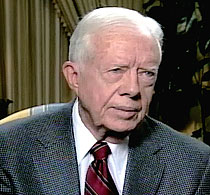2006年VOA标准英语-Former President Jimmy Carter Willing to Return
时间:2019-01-11 作者:英语课 分类:2006年VOA标准英语(十二月)
By Kane Farabaugh
Chicago, Illinois
06 December 2006
Former President Jimmy Carter says he is willing to make another historic trip to North Korea to help reach a diplomatic solution to the current nuclear standoff. In an exclusive interview, VOA's Kane Farabaugh talks with President Carter about how he sees a peaceful end to the current crisis.
(watch complete interview - dialup)

Jimmy Carter
It is one of the most challenging foreign policy issues facing the Bush administration -- how to get North Korea to give up its nuclear weapon development program.
The administration is reluctant to deal with the reclusive communist country unilaterally, but former President Jimmy Carter says those are part of the terms he's been given by representatives of North Korean leader Kim Jong Il.
"If the United States would agree to declare officially that we would not attack North Korea as long as North Korea didn't attack its own neighbor South Korea and so forth 1, and if we would agree to start working towards normal relations with North Korea -- to lift the embargo 2 against North Korea to let it be absorbed into the international community, that they would then stop again their production of nuclear weaponry and let inspectors 3 come back in. I'm not speaking for them, because I can't say that they either had the full authority to make those commitments to me or that they would carry them out if they were made."
Carter, whose academic background includes nuclear physics and reactor 4 technology, has the distinction of being the only U.S. President to visit North Korea.
It was 1994, when the communist country had expelled International Atomic Energy Agency inspectors from its Yongbyong facility, and threatened to develop weapons-grade plutonium. The move put the U.S. military on the brink 5 of war.
"The American General, Gary Luck, told me that if the war did break out it would be much more devastating 6 among South Koreans and others than the original, the first Korean War."
Carter asked the White House if he could travel to North Korea to attempt to broker 7 a deal as a peaceful means to end the nuclear standoff.
"I had a list of demands and requests that were given to me by the Clinton administration. I gave all of these to Kim Il Sung, the dictator of North Korea, and he agreed to all of them."
His trip to North Korea was considered a diplomatic success, creating what would be known as the "Agreed Framework" with the United States. Part of the agreement allowed IAEA inspectors to resume their work
"We agreed to build them some modern reactors 8 and to let them have fuel oil to replace the electricity they lost, and those were all good things. I also reached an agreement where the leader of North Korea would have direct summit talks with the leader of South Korea, the first time that it happened in 43 years -- that took place later on."
In 2002, President Bush declared North Korea part of an "axis 9 of evil" and ended direct talks. Pyongyang responded by once again removing IAEA inspectors from its nuclear facilities and began secret development of weapons grade plutonium.
"Therefore, they now have the capacity to have seven or eight nuclear explosives."
In the wake of North Korea's first successful nuclear weapon test in October of this year, the security situation in Asia grew more dangerous than it was during Carter's visit in 1994. In our interview, he indicated he is once again willing to help broker peace.
We asked Mr. Carter: "Have you had the opportunity yourself to be invited to go North Korea currently to meet with Kim Jong Il, and if you did, would you go?"
"Yes, I would go, with permission from the White House. I wouldn't go without that."
So far the White House has not granted President Carter permission to travel to North Korea. The Bush administration favors six-party talks with North Korea that includes South Korea, China, Japan, Russia and the United States. There is no date set for the next meeting between those countries… currently the only forum 10 to work on a peaceful solution to North Korea's nuclear standoff.
- The wind moved the trees gently back and forth.风吹得树轻轻地来回摇晃。
- He gave forth a series of works in rapid succession.他很快连续发表了一系列的作品。
- This country put an oil embargo on an enemy country.该国对敌国实行石油禁运。
- During the war,they laid an embargo on commerce with enemy countries.在战争期间,他们禁止与敌国通商。
- They got into the school in the guise of inspectors. 他们假装成视察员进了学校。 来自《简明英汉词典》
- Inspectors checked that there was adequate ventilation. 检查员已检查过,通风良好。 来自《简明英汉词典》
- The atomic reactor generates enormous amounts of thermal energy.原子反应堆发出大量的热能。
- Inside the reactor the large molecules are cracked into smaller molecules.在反应堆里,大分子裂变为小分子。
- The tree grew on the brink of the cliff.那棵树生长在峭壁的边缘。
- The two countries were poised on the brink of war.这两个国家处于交战的边缘。
- It is the most devastating storm in 20 years.这是20年来破坏性最大的风暴。
- Affairs do have a devastating effect on marriages.婚外情确实会对婚姻造成毁灭性的影响。
- He baited the broker by promises of higher commissions.他答应给更高的佣金来引诱那位经纪人。
- I'm a real estate broker.我是不动产经纪人。
- The TMI nuclear facility has two reactors. 三哩岛核设施有两个反应堆。 来自英汉非文学 - 环境法 - 环境法
- The earliest production reactors necessarily used normal uranium as fuel. 最早为生产用的反应堆,必须使用普通铀作为燃料。
- The earth's axis is the line between the North and South Poles.地轴是南北极之间的线。
- The axis of a circle is its diameter.圆的轴线是其直径。